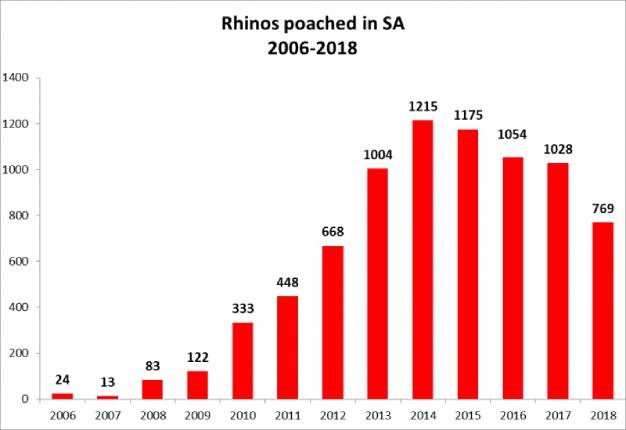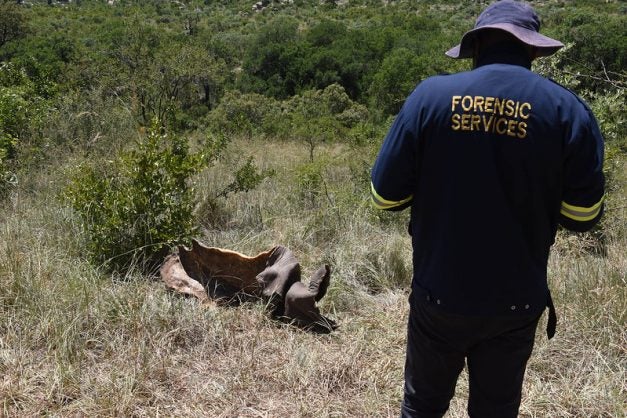
- Inspiring People -
- 5mins -
- 357 views
Decline in rhino poaching as South Africa clamps down on syndicates
Rhino poaching in South Africa has dropped significantly, seeing the 5th consecutive year of reductions following major crackdowns on organised crime syndicates.
South Africa and neighbours cooperate to fight cross-border syndicates
Rhino poaching in South Africa is on the decline as the government makes a concerted effort to battle the criminal activity that threatens a critically endangered species. The falling numbers in poaching have become an established trend over the past 5 years as law enforcement agencies cooperated to take down syndicates operating in South Africa and neighbouring countries.

The Cost of Rhino Horns
In 2018, 769 rhino were killed for their horns, but that was reduced to 564 in 2019 – a reduction of 26%. In particular, most South African provinces saw reductions in rhino poaching (only Limpopo and Gauteng registered increases). — reported RhinoReview.org last month.
Of these, a least 327 rhino were lost in the Kruger National Park alone as a result of 2,014 recorded “incursions and poacher activities”.
According to the department of Environment, Forestry and Fisheries, rhino poaching peaked in 2014 when 1,215 rhino were killed for their horns. Only 13 rhino were poached in 2007, the lowest number recorded since 2006.
Most of the rhino horns are illicitly shipped to east Asian markets where it commands a price higher than gold per kilo.
On the black market in SA, rhino horn costs about $6,00 per kilogram, according to National Geographic, and up to 10 times that in Asian black markets.
This means that one of the main drivers of rhino poaching is organised crime networks.
“Because wildlife trafficking constitutes a highly sophisticated form of serious transnational organised crime that threatens national security, the aim is to establish an integrated strategic framework for an intelligence-led, well-resourced, multidisciplinary and consolidated law enforcement approach to focus and direct law enforcement’s ability supported by the whole of government and society,” said Environment, Forestry and Fisheries Minister Barbara Creecy.
The department highlighted the successes law enforcement entities – including the Stock Theft and Endangered Species Unit of SAPS, the Hawks, SANParks, provincial park authorities and Environmental Management Inspectors (Green Scorpions) and Customs as well as the National Prosecuting Authority – in combating rhino poaching and working to secure convictions.
In 2019, 178 poachers were arrested for rhino poaching in the Kruger Park. And nationally, 332 were arrested for both poaching and rhino horn trafficking.
Law enforcement officials confiscated 85 guns in the year and secured a number of high-profile convictions.
Source: DuncanAlfreds/RhinoReview.org

Syndicates targeted, 145 people sent to prison
“A decline in poaching for five consecutive years is a reflection of the diligent work of the men and women who put their lives on the line daily to combat rhino poaching, often coming into direct contact with ruthless poachers,” said Environment, Forestry and Fisheries Minister Barbara Creecy.
In April, the Hawks arrested two men near Hartbeespoort for being in possession of 181 rhino horns. They remain in jail, pending the finalisation of their trial.
In November, three members of a syndicate were also arrested in Klerksdorp and Hartbeesfontein. They were found in possession of 100 rhino horns, as well as tiger carcasses, several weapons and ammunition.
In terms of convictions, 145 people were sentenced to prison terms ranging from two to more than 15 years.
South African law enforcement agencies have also received cooperation from China, Hong Kong, Malaysia, Singapore, Vietnam and Japan to assist in combating wildlife trafficking.
“The success of the operations demonstrates government’s ability to work together in fighting wildlife trafficking in South Africa,” said Creecy.
Source: RhinoReview.org

Too early to celebrate decline in rhino poaching numbers, say WWF
Although concerted efforts are being made to curb poaching, both in Mozambique and South Africa, issues are being exacerbated by poachers posing as ordinary tourists, or using villages to gain entry into the Kruger National Park.
Deff Minister Barbara Creecy said efforts to curb poaching are in line with the Integrated Strategic Management of Rhinoceros, as well as the draft of the National Integrated Strategy to Combat Wildlife Trafficking (NISCWT). The draft was recommended in 2016, but has yet to be officially implemented.
However, celebrations over the positive news of a slight decline in rhino poaching numbers may be short-lived. According to the World Wildlife Fund’s (WWF) reaction to the statistics for 2019, the fact that the NISCWT has not yet been adopted in parliament is worrying.
This, compounded with the sobering reality that rhino poaching numbers could only be dropping due to there being less living rhinos in the country, means current poaching numbers may not be as positive as initially thought.
This point was not touched on by Creecy, the organisation noted with concern. Despite cautious optimism, the WWF said, organised crime syndicates continue to thrive, capitalising on poverty and desperation facing both South Africa and Mozambique.
The availability of suitable habitats for threatened species in the long term also remains uncertain.
For more on this, click here.
Source: RhinoReview.org

More positive pachyderm news
- RARE JAVAN RHINO POPULATION UP IN LATEST COUNT
- RHINO POPULATION IN TANZANIA UP 1,000% SAY GOVERNMENT AFTER CRACKDOWN ON POACHING
- ONE OF AFRICA’S LARGEST WILDLIFE RESERVES MARKS A YEAR WITHOUT ELEPHANT POACHING
- THIS WOMAN’S DREAM TO END ELEPHANT SUFFERING GREW INTO A NATURE PARK WHERE THE ANIMALS ROAM FREE

